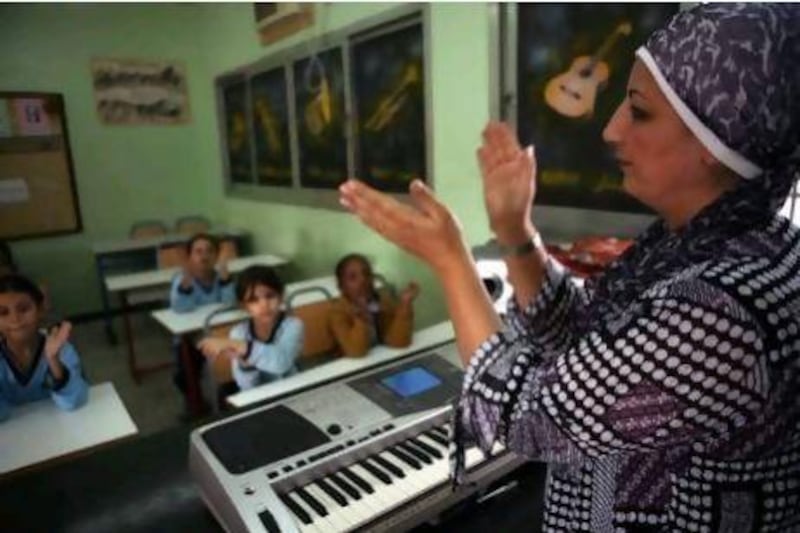DUBAI // State schools have been urged to introduce more art and drama classes to raise academic scores, combat bullying and reduce dropouts.
Children are exposed to few creative arts lessons at government schools, with occasional recitals and workshops the only outlet for their talents.
The chances of identifying and developing those capabilities are slimmer in the higher grades, because music classes stop after Grade 6 and art classes at Grade 10.
State school pupils in the capital can expect a better-rounded education in higher grades when Adec's New School Model is rolled out in secondary schools from 2013.
Ebtisam Abdulaziz, an Emirati artist, was delighted to hear authorities in the capital were taking the arts seriously.
"I myself did not get any art education," said Ms Abdulaziz, 35. "The art sessions were rare and there was no curriculum. The art teacher would ask us to paint anything we liked.
"There was no creativity or any kind of development of our skills."
She left high school with no background in art. "I did not know the names of any famous artists or the history either, which is a shame."
Ms Abdulaziz began teaching art classes privately in 2002 to ensure others didn't suffer the same fate. "An artist must share knowledge, so I thought I will keep doing this until the ministry takes the decision to give it better care."
There are teachers such as Ms Abdulaziz around the world, who advocate strong arts programmes. Studies have repeatedly shown that lessons in art and music raise overall pupil achievement and performance.
A study last year in the United States by the President's Committee on the Arts and the Humanities found arts education to be an effective tool for school reform.
The report found schools in five cities where arts was integrated with other subjects had higher mathematics and reading scores.
Another 10-year study conducted by the anthropologist Shirley Brice Heath found students involved in arts education for at least nine hours a week were four times more likely to have high academic achievement and three times more likely to have high attendance.
The theatre director Maggie Hannan plans to open an acting studio in the capital this September, called Drama Moves. She said drama classes taught children problem-solving skills.
"For example, I give them a feather and they have to find a way to use it as a stimulus for their play," she said.
She said it also reduced bullying and made them confident. "They learn how to be constructive rather than putting people down, and accept suggestions without getting defensive."
Ms Hannan found great interest among pupils at an Adec school in Al Gharbia when she took a few sessions for them. "Pupils want to be given a chance to excel and, in the session where I taught physical theatre, they could."
Arezu Karoobi, 29, who teaches art techniques to teenagers at Dubai Community Theatre and Arts Centre, said arts should be introduced at an early age. "For young children it gives them focus and they learn hand coordination."
Ms Karoobi, who has a background in painting, theatre and photography, said it was also therapeutic for teenagers and children with special needs who find it hard to express themselves. "Working with the different material also helps to calm hyperactive children."
Faisal Salah, 21, who is studying media at Zayed University, grew up wishing for these platforms at school.
"I looked at my favourite actors and directors and the opportunities they had in drama in school and college," said Mr Salah, who is assisting Ms Hannan in directing a play.
"They benefited from that. It adds confidence and builds character."
He does not want his 11-year-old brother to miss out and will be enrolling him in Ms Hannan's classes next month. "He is a funny character and energetic. But, like me, he too does not have the opportunity to display it at school."
[ aahmed@thenational.ae ]






